Centre for Policy Development's Blog, page 10
December 11, 2022
MEDIA RELEASE: Climate risk regime can make Australia part of the solution
Monday 12 December 2022 – The announcement of moves towards a clear and uniform taxonomy for climate risk and opportunity for Australian corporate and financial institutions is a vital and necessary step towards an orderly climate transition.
Today’s announcement by Federal Treasurer Jim Chalmers at the Australian Sustainable Finance Institute will ensure greater certainty and confidence among investors, businesses and regulators to respond to the financial risks and opportunities presented by climate change and the global energy transition.
The signalled intention to include Commonwealth entities in the reporting regimes alongside other market participants will support clearer and more complete pictures of climate risk and opportunity at a national, regional, global and sectoral level.
As industry consultation commences alongside the work of the International Sustainability Standards Bureau, the development of an Australian climate risk disclosure regime will see the Australian financial system better positioned to participate in an swift, orderly and just transition to net zero.
Centre for Policy Development Sustainable Economy Program Director Toby Phillips said the announcement signalled an intention to build climate resilience and adaptability into the Australian financial system.
“The largest and most influential private sector investors and corporations are overwhelmingly responding to climate risk in line with established and emerging frameworks,” Mr Phillips said.
“They are doing this because it makes good business sense to respond to the way climate change is reshaping the global economy and global financial markets.
“Despite leadership from some of the biggest players, there is still significant variance in how the financial sector deals with climate risk.
“The government’s decision to move Australian markets into line with this global practice will deliver greater comparability, certainty and clarity both within Australia and abroad, and will empower regulators, businesses and investors to participate in sustainable finance with confidence.
“The indication that public authorities will be included in this taxonomy is important as they are some of the most significant participants in the Australian economy, and yet they are insulated from the pressures that have led to climate risk disclosure across private markets.
“Nevertheless their inclusion is necessary for a complete and shared picture of climate risk and opportunity for investors, business leaders and policymakers”.
ENDS
Background on CPD’s sustainable economy program:
The Centre for Policy Development’s sustainable economy program has undertaken significant work on climate risk and the economy. This has included:
Work on directors’ duties and climate risk – incorporating the influential Hutley Hartford-Davis OpinionsPublic forums on governance and capital markets,Modelling of the impacts of changing export markets on Australian local economies,Research on the effect of climate policy on Australia’s terms of trade and the cost of capitalHosting public addresses by senior public sector leaders on climate riskResearch on climate risk in public authorities
The post MEDIA RELEASE: Climate risk regime can make Australia part of the solution appeared first on Centre for Policy Development.
December 8, 2022
Australia-Indonesia Energy Transition Policy Dialogue | First meeting, December 6 2022
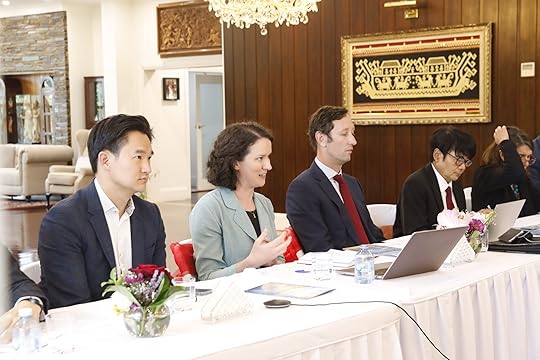 Participants in Canberra gathered at the residence of the Ambassador for Indonesia
Participants in Canberra gathered at the residence of the Ambassador for Indonesia The first meeting of the Australia-Indonesia Energy Transition Policy Dialogue was held in Canberra, Jakarta and online on 6 December 2022.
The Dialogue continues the focus on cooperation between Australia and Indonesia on the practical, policy and financial aspects of energy transition that emerged from the successful G20 Seminar Series CPD co-convened in Jakarta in July 2022 with the G20 Energy Transition Working Group, Climateworks Centre, the Institute of Essential Services Reform (IESR), Indonesia Research Institute for Decarbonization (IRID) and the International Institute for Sustainable Development (IISD).
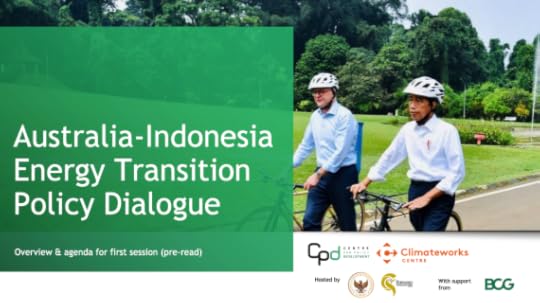 The participant deck from and pre-reading from the first meeting of the Australia-Indonesia Energy Transition Policy Dialogue
The participant deck from and pre-reading from the first meeting of the Australia-Indonesia Energy Transition Policy Dialogue Dialogue participants reflected on the progress and momentum obtained at G20, and its implications for a swift, orderly and just energy transition across the countries and in the region.
They discussed the role of energy infrastructure in a just transition, identifying areas of common interest and shared challenges.
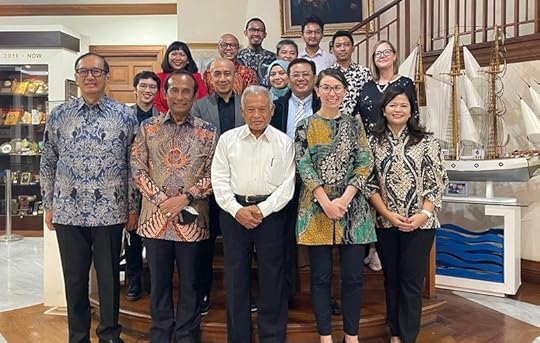
Participants in the first Australia-Indonesia Energy Transition Policy Dialogue in the Purnomo Yusgiantoro Center in Jakarta
The meeting also discussed governance and finance aspects of energy transition, including the role of public finance support mechanisms to catalyse investment.
This dialogue was the first in a multi-year collaboration between CPD and Climateworks and will continue to convene dialogues and conduct analysis over coming months.
We are grateful to the Indonesian Embassy in Canberra and the Purnomo Yusgiantoro Center in Jakarta for hosting participants in-person for this event.
Key Documents About the Australia-Indonesia Energy Transition Policy DialogueThe Centre for Policy Development (CPD) is pleased to partner with Climateworks Centre to convene the Australia-Indonesia Energy Transition Policy Dialogue as part of CPD’s Australia in the Indo Pacific Program; building on years of work in sustainable economies and dialogues in the region.
The is an informal meeting of senior officials, regulators, business and non-government experts from Australia, Indonesia and the region. It supports formal policy development processes through roundtables, research and analysis. It hold no official status and participants attend in a personal capacity.
In line with CPD’s custom meetings conducted under the Chatham House Rule and on an invitation-only basis to ensure those involved can participate candidly.
The post Australia-Indonesia Energy Transition Policy Dialogue | First meeting, December 6 2022 appeared first on Centre for Policy Development.
December 7, 2022
Investing for Australia – Clarifying Climate Risk Expectations for the Future Fund

Investing for Australia is a report from the Centre for Policy Development’s Sustainable Economy Program. It follows previous reports and a broader stream of work on the management of climate risk in public authorities.
The report assesses the Future Fund’s climate risk management using publicly available information.
It uses established tools and compares the Future Fund’s climate risk approach to practices at other institutional investors, including other sovereign wealth funds.
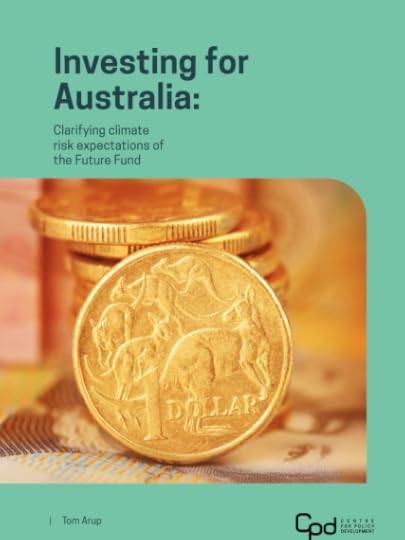
The Future Fund is Australia’s main sovereign wealth fund (SWF). It invests on behalf of taxpayers. It gets capital from budget surpluses, and from the sale of Telstra. In 2022 the Future Fund had nearly a quarter of a trillion dollars under management.
The Future Fund is overseen by a board and it is broadly directed by an Investment Mandate and a Statement of Expectations issued by the Finance Minister, and it is required to maximise long-term returns relative to risk, and to adhere to international investment industry best practice.
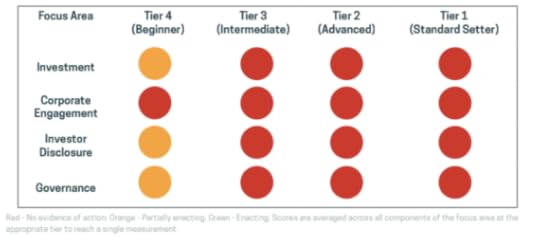
A review of the Fund’s publicly known activities using the ICAP Expectations ladder – an established industry tool, shows partial early stage practice typical of an investor “at the start of their climate journey”.
The report makes three recommendations to set the Future Fund on the path to climate risk leadership:
Request published climate risk disclosure using global standards and emerging frameworksEnsure the Future Fund is covered by any new laws governing climate risk disclosure in AustraliaSet up an independent review by a panel of experienced investment professionals to consider changes to the Future Fund Investment Mandate or Letter of Expectations to align the Fund’s climate risk response with industry best practice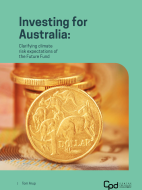 Read the Paper [PDF]
Read the Paper [PDF]
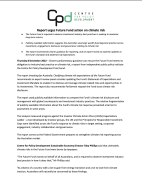 Media Release
Media Release
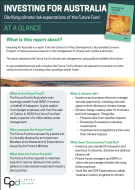 At a Glance
At a GlanceThe post Investing for Australia – Clarifying Climate Risk Expectations for the Future Fund appeared first on Centre for Policy Development.
December 1, 2022
2035 Climate Initiative Roundtable One
The 2035 Climate Initiative met for the first time in a virtual roundtable on Wednesday 30 November, 2022.
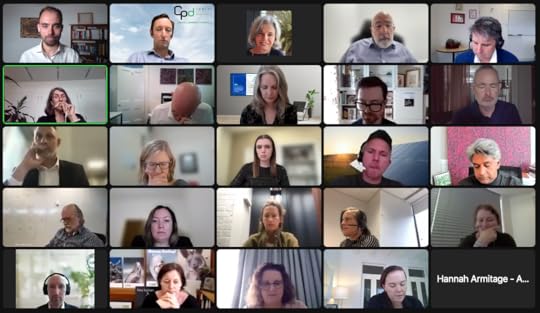
The 2035 Climate Initiative is coordinated by the Centre for Policy Development and Climateworks Centre, and overseen by a steering group that includes the Australian Council of Trade Unions (ACTU), Australian Industry Group (Ai Group) and Pollination.
Its policy roundtables include participation from leaders and experts across government, industry, finance, research institutes and civil society.
In line with the custom of the Centre for Policy Development’s roundtable discussions, meetings are held under the Chatham House Rule.
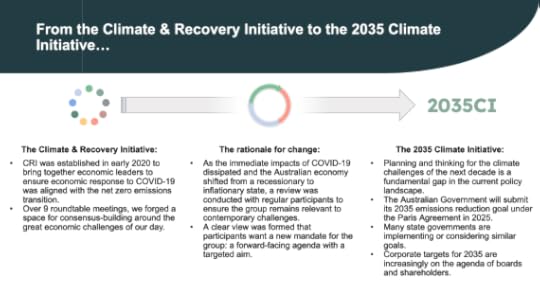 At the first 2035 Climate Initiative roundtable participants discussed a renewed focus for the group looking ahead to major changes in adaption and mitigation beyond this decade.
At the first 2035 Climate Initiative roundtable participants discussed a renewed focus for the group looking ahead to major changes in adaption and mitigation beyond this decade.
It was noted limiting temperature rise to 1.5 degrees above pre-industrial levels would require transformation across the Australian economy, including in hard-to-abate sectors such as transport and industry.
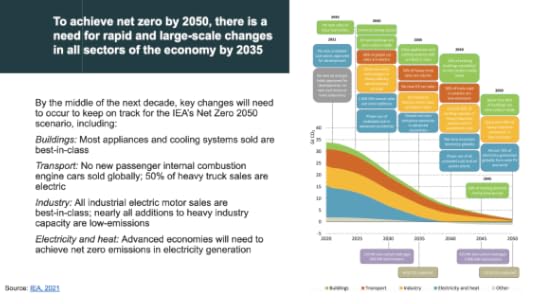 Practical pathways at a global, national and sector level to emissions reductions in line with a 1.5 degree target were discussed. Participants also discussed the climate impact of the G20 Bali Declaration and COP27.
Practical pathways at a global, national and sector level to emissions reductions in line with a 1.5 degree target were discussed. Participants also discussed the climate impact of the G20 Bali Declaration and COP27.
Participants discussed the events of COP 27, and the need to prevent backsliding after Glasgow.
In addition to recent progress on renewable energy and financing, the group discussed Australia’s support for a funding that addresses loss and damage.
Discussion emphasised the importance of Australia’s continued advocacy for funding arrangements that meet the needs of those most exposed to climate change impacts, including in the Pacific.
Key documents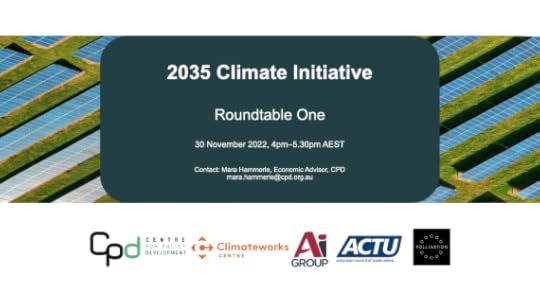 Meeting Pack
Meeting Pack
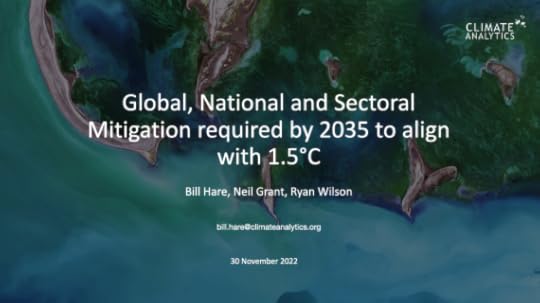 Climate Analytics Presentation
About the 2035 Climate Initiative
Climate Analytics Presentation
About the 2035 Climate InitiativeThe 2035 Climate Initiative is an evolution of the Climate and Recovery Initiative (2020-2022).
We look beyond the horizon of the current decade, and identify the best ideas and opportunities for aligning Australia’s long-term economic future with climate and transition priorities. Our stakeholder roundtable series brings together trusted leaders, experts and advisers from business, regulation, policy and the community to consider the challenges and opportunities ahead.
The post 2035 Climate Initiative Roundtable One appeared first on Centre for Policy Development.
November 21, 2022
Roundtable on Alternatives to the Detention (ATD) of Children in the Context of Migration in Asia Pacific | 1-2 November 2022, Putrajaya, Malaysia
After convening four times virtually during the COVID-19 pandemic, it was wonderful to be back together in person on 1-2 November 2022 in Malaysia, almost exactly three years after our first meeting in Thailand.
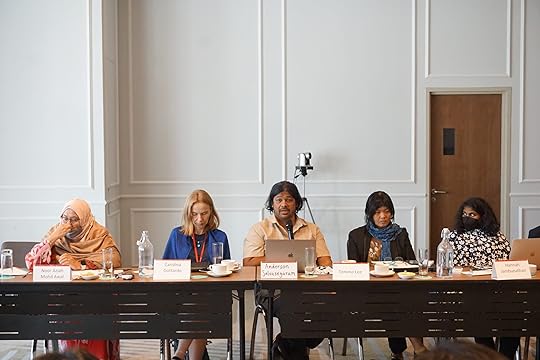
The ADFM Secretariat and IDC (International Detention Coalition) were delighted to hold this in-person Roundtable meeting in Putrajaya, attended by around 35 people from operational and policy agencies in governments in Australia, Indonesia, Malaysia, New Zealand, and Thailand, as well as national and international civil society groups.
The Roundtable discussed latest developments and positive practice relating to migration policies and alternatives to detention (ATD) for children in the context of international migration and respond to challenges states are facing. It was remarkable to note the improvements in the region since we last met in 2019, and the continued enthusiasm for ongoing peer-learning and mutual support.
Over the course of two days, participants discussed concrete policy issues such as monitoring and evaluation, and meaningful engagement of refugee and lived experience voices in policy and programming. There was also plenty of time in small groups to discuss national level priorities and how the Platform can continue to support progress on alternatives to child detention and related issues.
During plenary and group discussion, organisers welcomed participants’ strong desire to develop policies and activities in the best interests of the child in their countries. One government participant described the Platform meeting as the right kind of “spark” that was needed to catalyse change on these issues.
Participants identified a number of areas for concrete future cooperation and are also interested to meet annually in person, with virtual sessions in the interim. The ADFM Secretariat and IDC are pleased with their ongoing collaboration on this Platform and are looking ahead to its sustainability.
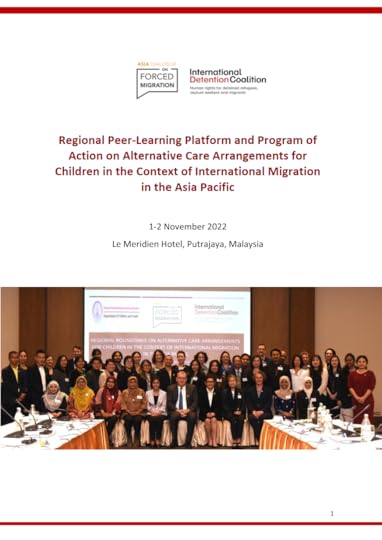
The post Roundtable on Alternatives to the Detention (ATD) of Children in the Context of Migration in Asia Pacific | 1-2 November 2022, Putrajaya, Malaysia appeared first on Centre for Policy Development.
November 6, 2022
RBA Review submission: Equipping the RBA for a dynamic climate risk and transition response
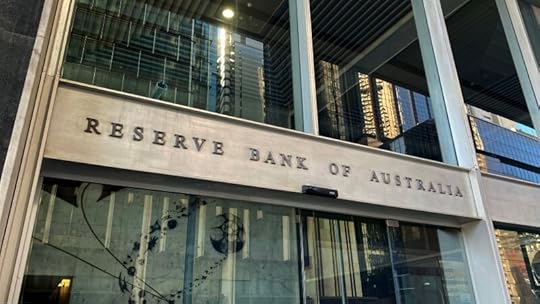
Equipping the RBA for a dynamic climate risk and transition response is a submission to the Commonwealth Treasury Review of the RBA, from CPD’s Sustainable Economy Program.
The Reserve Bank is governed by a 63-year-old law that requires the RBA Board to contribute to economic prosperity and welfare. It makes sense to update this mandate to account for the realities of climate change and the need for a swift, just and orderly transition to net zero emissions to maintain the stability of the financial system.
The report recommends that the RBA review update the central bank’s legislative mandate to consider sustainability, climate risks and opportunities, and the maintenance of net zero carbon emissions.
Short of a full legislative update, the submission also suggests other ways the government can clarify its expectations around the interactions between monetary policy, climate policy, and fiscal policy.
Recommendations also include an expanded role for green bonds in line with international practice, more advice from the Bank on economic responses to climate change, clear risk disclosure, and tighter expectations on corporate bond issuers.
The submission draws on CPD’s history of work on the economic and legal frameworks needed to navigate climate change. In 2019, CPD hosted then-RBA Deputy Governor Dr Guy Debelle in a landmark speech on the economy and climate change.
The authors of the submission are Toby Phillips, Tom Arup, and Mara Hammerle.
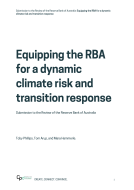 Read the Paper [PDF]
Read the Paper [PDF]
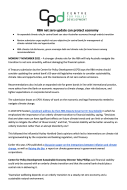 Media Release
Media Release
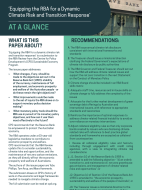 At a Glance
At a GlanceThe post RBA Review submission: Equipping the RBA for a dynamic climate risk and transition response appeared first on Centre for Policy Development.
October 19, 2022
CPD thanks Terry Moran, welcomes Sam Mostyn as Chair
 Clockwise from top left: Terry Moran, Sam Mostyn, Don Russell, Rob Partos CPD thanks Terry Moran, welcomes Sam Mostyn as Board Chair After six years as Chair of the Board of the Centre for Policy Development, Terry Moran AC retired from the role at CPD’s Annual General Meeting on October 20 In line with succession planning Sam Mostyn AO was named Chair, and Dr Don Russell Deputy Chair
Clockwise from top left: Terry Moran, Sam Mostyn, Don Russell, Rob Partos CPD thanks Terry Moran, welcomes Sam Mostyn as Board Chair After six years as Chair of the Board of the Centre for Policy Development, Terry Moran AC retired from the role at CPD’s Annual General Meeting on October 20 In line with succession planning Sam Mostyn AO was named Chair, and Dr Don Russell Deputy Chair At the Centre for Policy Development AGM on Thursday 20 October CPD announced that long-standing chair, Terry Moran AC, and Treasurer Rob Partos, have retired from the board.
Terry and Rob served on the board for considerable periods, and brought great leadership to the organisation. Under Terry’s guidance the Centre for Policy Development has become a potent force for bold, practical and collaborative reform throughout Australia and across our region.
With former CEO Travers McLeod, Terry oversaw the formation of the Create-Connect-Convince method, and guided CPD’s influence across many dimensions of public policy, within Australia and in our relations with the region.
In line with long-term succession planning Sam Mostyn AO was named Chair and Dr Don Russell Deputy Chair.
Sam Mostyn has been a CPD Board member since 2017, and currently serves as Deputy Chair.
She brings to the role a wealth of leadership experience across multiple sectors, deep relationships with senior leaders, and an intimate familiarity with CPD’s method, networks and values.
Dr Don Russell has been a member of CPD’s Board since 2018.
Don has public and private sector leadership experience at the highest level, and represented Australia as Ambassador to the United States.
The post CPD thanks Terry Moran, welcomes Sam Mostyn as Chair appeared first on Centre for Policy Development.
September 28, 2022
Principles for an effective wellbeing budget

Principles for an Effective Wellbeing Budget is a briefing paper by the Centre for Policy Development’s Wellbeing Government Initiative.
It builds on the research contained in the Redefining Progress report to articulate working principles for the October 2022 Federal Budget in the context of a broader Australian approach to wellbeing government and economics.
It recommends:
Explicit goals through clear links between wellbeing measurements and policy decisionsLong-term change on the things that matter through upstream analysisBuilding foundations for effective government by developing the right skills, guidance and collaborations across government
Beyond the 2022/23 budgetary cycle the briefing note recommends:
Staying on course with regular progress assessmentsSystems that embed wellbeing into decision-making across governmentGuardrails through independent oversightCommunity dialogue to determine what matters mostThe briefing note was written by CPD Senior Wellbeing Adviser Dr Cressida Gaukroger and Strategic Adviser Dr Katherine Trebeck
 Read 'Principles for an effective wellbeing budget'
Read 'Principles for an effective wellbeing budget'
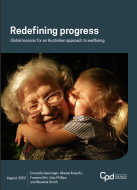 Read 'Redefining Progress'
Read 'Redefining Progress'The post Principles for an effective wellbeing budget appeared first on Centre for Policy Development.
September 27, 2022
MEDIA RELEASE: CPD Welcomes Joint Commitment to Transform Early Education
Directors of Australian public authorities should take a rigorous and holistic approach to climate risk to build a whole of government picture of climate risk exposure, new research has found.
The Raising the Bar: Managing climate change risk in public authorities report released Wednesday by independent public policy institute the Centre for Policy Development recommends ministerial statements to provide guidance to directors, standardised frameworks across public authorities, and audit office scrutiny of climate risk disclosures.
An analysis of annual reports published by Commonwealth, state and territory authorities found that only a small proportion discuss climate risk management.
While the climate reporting practices of some public authorities are moving towards best practice – the reporting practices of many others are not. Raising the Bar highlights steps some states and public authorities are taking to manage climate risk to encourage others to follow their approach.
The report recommends clear and transparent policy direction through ministerial statements; standard frameworks for risk assessment, particularly around financial risk; and use of audit office authorities to consider climate change risks among government agencies and public authorities.
Report author, CPD Fellow Dr Arjuna Dibley said that the urgency for consistent risk practices across the public and private sectors had increased.
“Climate risks that public authorities face have only become more pronounced, with extreme weather events such as heatwaves, heavy rainfall, cyclones, droughts and fire projected to increase and Australia’s export markets begin to transition to new forms of energy,” Dr Dibley said.
“Ultimately the climate risk of public authorities rests with the public – we all have a strong interest in making sure these risks are managed appropriately.”
CPD Climate Lead Tom Arup said while directors in the private sector had dramatically enhanced their position on climate risk in response to evolving regulatory, legal and shareholder expectations, public sector counterparts were slipping behind.
“A complete picture of national climate risk must include the public sector,” Mr Arup said.
“Public authorities oversee substantial finances, as well as critical assets such as water and electricity infrastructure that have a high degree of climate risk exposure.
“Clear and transparent signals setting expectations around climate risk assessment, disclosure and mitigation would bring governance practices in public authorities into line with private sector best practices.
“Our national response to climate-change requires a whole-of-government picture of climate change-related risk. This picture necessarily includes a thorough and proactive effort to produce, disclose and address climate change-related risks on the part of individual public authorities.”
ENDS
The post MEDIA RELEASE: CPD Welcomes Joint Commitment to Transform Early Education appeared first on Centre for Policy Development.
Raising the Bar: Managing climate change risk in public authorities
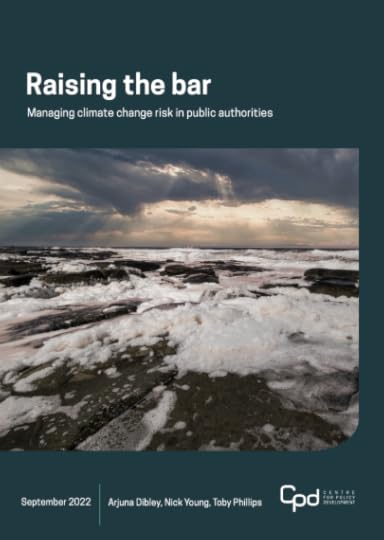
Raising the Bar: Managing Climate Change Risk in Public Authorities is a report from the Centre for Policy Development’s Sustainable Economy Program.
It recommends that clear, transparent policy direction be provided to public authority directors. This can enable them to contribute to a whole-of-government picture of climate risk that meets and raises the standards that apply to all organisations, public and private, in discovering, disclosing and addressing climate risk.
Raising the Bar examines the legal and practical aspects of how directors’ duties in public authorities and government-owned corporations (GOCs) apply in relation to climate risk, and makes six recommendations for best practice.
Give clear and transparent policy direction through ministerial statementsStandardise the technical frameworks for risk assessment, particularly around financial risk disclosure, for example by adapting the private sector framework from the Task Force on Climate-related Financial DisclosureCreate a whole-of-government picture of climate risk exposureLeverage audit offices’ authority to consider climate change risks among government agencies and/or public authoritiesInvest in building capability and capacityInfluence private sector take-up of climate change risk reportingThe report authors are CPD Fellow Dr Arjuna Dibley, Nick Young and Sustainable Economy Program Director Toby Phillips.
 Read 'Raising the Bar'
Read 'Raising the Bar'
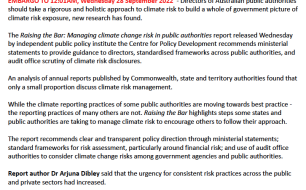 Media Release
Media Release
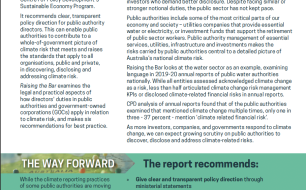 'Raising the Bar' at a glance
'Raising the Bar' at a glanceThe post Raising the Bar: Managing climate change risk in public authorities appeared first on Centre for Policy Development.
Centre for Policy Development's Blog
- Centre for Policy Development's profile
- 1 follower



